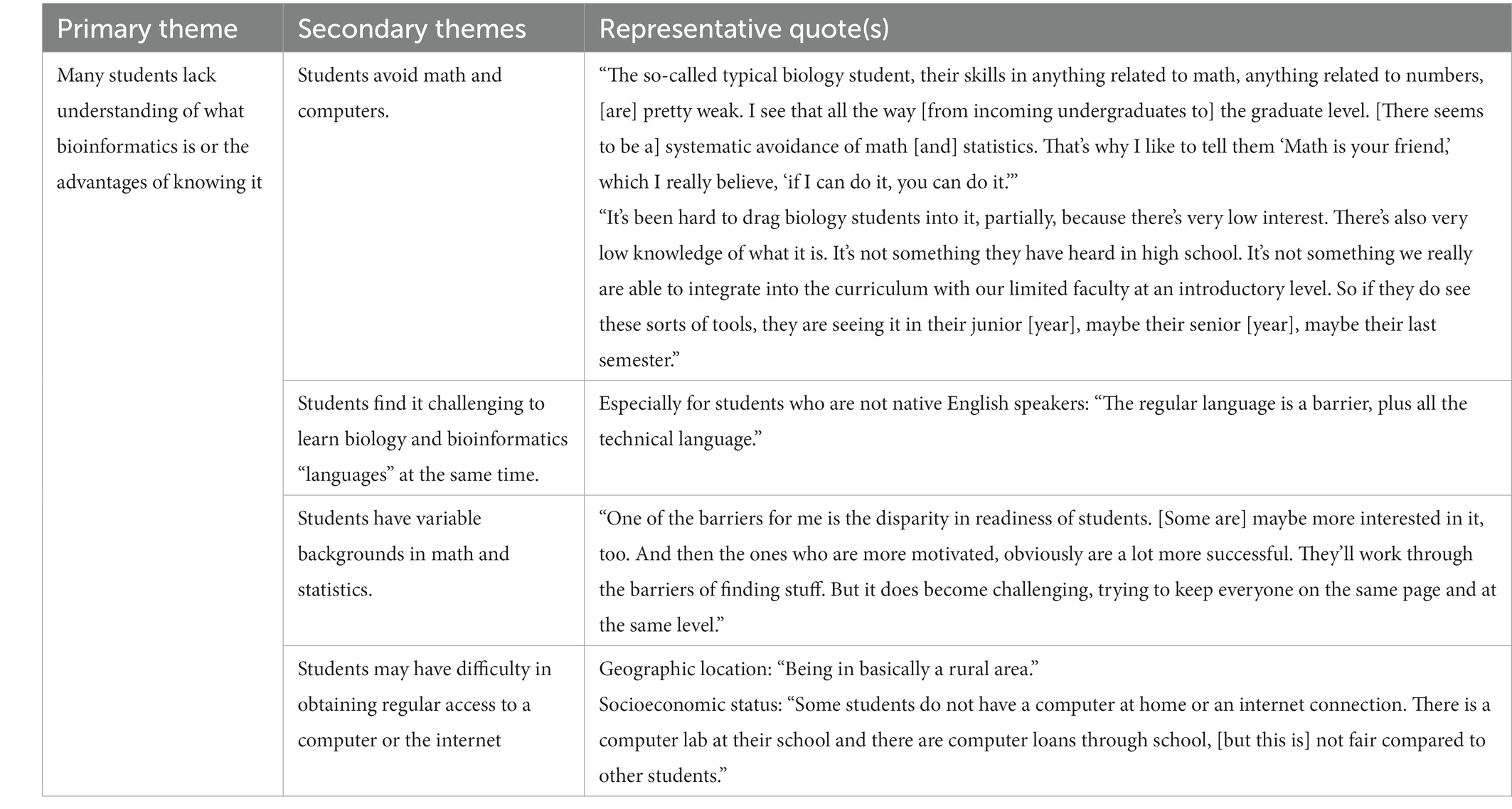Bioinformatics Tutor - The Facts
Wiki Article
Bioinformatics Tutor Can Be Fun For Anyone
Table of ContentsLittle Known Questions About Bioinformatics Tutor.Everything about Bioinformatics TutorThe Buzz on Bioinformatics TutorThe Of Bioinformatics TutorAll about Bioinformatics Tutor
Preliminary project development is relatively time-consuming, as it entails mindful planning of the subject, structuring of deliverables, and factor to consider of the skills and experience degrees of participants. However, as soon as a task has been plainly defined and executed, it has the potential to be recycled in future sessions with only small revisions to reflect updates in the area or accommodate distinctions in individual backgrounds. This makes project-based finding out a lasting and reliable mentor strategy over time, especially in swiftly advancing disciplines like bioinformatics.To make certain continuity and reproducibility of understanding, offering common lab note pads-- either physical or electronic-- is critical. These notebooks work as joint logs where students can tape their progression, code, approaches, and results throughout the training course. Not only do they strengthen understanding by motivating documents and representation, but they likewise work as post-course reference materials that individuals can consult in future research or academic tasks.
Mentors play a crucial role in the success of project-based training courses. Ideally, coaches need to be active researchers with a extensive and updated understanding of both the academic foundations and practical applications of bioinformatics in their respective self-controls. Their capability to bridge complicated ideas and real-world application is essential in helping students navigate the challenges of interdisciplinary research. Moreover, mentors also serve as good example and influence trainees to proceed pursuing careers in computational biology and related fields.
Fascination About Bioinformatics Tutor
Another key aspect of the knowing process is offering participants the opportunity to offer their work to others, especially to an audience beyond their instant project group. Final discussions or mini-conferences enable students to articulate their findings, get positive comments, and gain self-confidence in interacting clinical content. This discussion component is often a favorite amongst trainees, as it validates their initiatives and highlights the real-world relevance of their work.Each iteration of the program was fine-tuned based on participant comments and advancing ideal practices in pedagogy. Bioinformatics Tutor. These adaptations guaranteed that the core goals-- hands-on learning, collaboration, and applied analytic-- continued to be intact while expanding the depth and breadth of topics covered.
A significant visualization that recorded individual view was a word cloud produced from actions to the 2014 end-of-course study. Individuals were asked, "What was the most effective component of the program?" and their actions were put together into a graphical word cloud. In this representation, the dimension of each word shows just how regularly it was pointed out, with words like "hands-on," "partnership," "real-life issues," "advice," and "interactive" showing up most plainly. This visual comments enhanced the program's focus on experiential knowing and advisor assistance.
The contributions of individuals such as Rustici, G., Orchard, S., Cowley, A., and Twells, R., along with other members of the EBI user-training-working team, contributed in improving the training course structure and content. Their insights aided shape a inclusive and adaptable model that could be adjusted to different institutional and regional contexts.
An Unbiased View of Bioinformatics Tutor

Jones, Rasmussen, and Moffitt (1997) also promoted for interdisciplinary understanding through joint project work, noting its capability to simulate professional environments and prepare trainees for future scholastic or industry roles. In a detailed review, Thomas (2000) evaluated multiple research studies on PBL and wrapped up that pupils not only carry out well academically but also create a much deeper understanding of the subject issue and improved team effort skills.
In the context of bioinformatics education, innovative techniques like class video games and simulation-based training have also been employed. Schneider and Jimenez (2013) introduced the usage of interactive video games to instruct organic data combination, making it possible for students to comprehend complex ideas via experiential learning. This type of gamification enhances the hands-on learning highlighted in project-based company website training courses by presenting an element of enjoyable and competition, which can additionally boost engagement.
Returning to the program reviewed here, the lessons gained from the execution of project-based learning in a bioinformatics setting have wider ramifications for various other STEM areas. The methodology emphasizes not just technical efficiency, however additionally interaction, collaboration, and vital reasoning-- abilities that are significantly valued in both academia and market.
Indicators on Bioinformatics Tutor You Need To Know
The scalability of the course format also makes it a feasible version for various other organizations. With ideal modification based upon regional requirements, offered resources, and individual accounts, the framework can be reproduced or adapted for use in other scientific domain names. In addition, the inclusion of organized mentorship and evaluation techniques assists guarantee consistent high quality and measurable learning outcomes.
To conclude, project-based discovering in bioinformatics uses a powerful approach to mentor complex, interdisciplinary web content in a manner that is both available and intellectually promoting. By stressing cooperation, functional application, and crucial questions, such efforts not just improve specific discovering but likewise add to the growing of a brand-new generation of cutting-edge and experienced scientists.
8 Simple Techniques For Bioinformatics Tutor
Another secret facet of the discovering procedure is offering individuals the opportunity to provide their job to others, particularly to a target market past their immediate job team.In the broader instructional literary works, project-based knowing (PBL) has been extensively studied and validated as an efficient technique for advertising deep understanding, essential reasoning, and transferable abilities. Adderley et al. (1975) emphasized the worth of project approaches in higher education, noting that they promote energetic knowing and autonomy. Schneider and Jimenez (2013) introduced the usage of interactive games to teach biological information assimilation, allowing students to realize complicated ideas with experiential view it understanding.
Report this wiki page